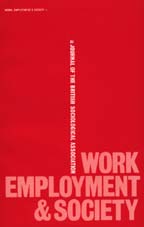Crossref Citations
This article has been cited by the following publications. This list is generated based on data provided by
Crossref.
Kirkpatrick, Ian
1999.
Workplace assimilation and conflict in professional service organisations: the case of university libraries.
Public Policy and Administration,
Vol. 14,
Issue. 4,
p.
71.
Fenwick, Peter
and
Cordey‐Hayes, Martyn
2000.
The formation of a labour strategy in the Benefits Agency.
Human Resource Management Journal,
Vol. 10,
Issue. 2,
p.
58.
Brown, Brian
Crawford, Paul
and
Darongkamas, Jurai
2000.
Blurred roles and permeable boundaries: the experience of multidisciplinary working in community mental health.
Health & Social Care in the Community,
Vol. 8,
Issue. 6,
p.
425.
Fairbrother, Peter
2000.
British Trade Unions Facing the Future.
Capital & Class,
Vol. 24,
Issue. 2,
p.
11.
Corby, Susan
2000.
Employee relations in the public services: a paradigm shift?.
Public Policy and Administration,
Vol. 15,
Issue. 3,
p.
60.
Fenwick, P.
and
Cordey-Hayes, M.
2001.
Technology change and management strategy in the Benefits Agency.
Technovation,
Vol. 21,
Issue. 3,
p.
167.
Fairbrother, Peter
and
Poynter, Gavin
2001.
State Restructuring: Managerialism, Marketisation and the Implications for Labour.
Competition & Change,
Vol. 5,
Issue. 3,
p.
311.
Rosenthal, Patrice
2004.
Management Control as an Employee Resource: The Case of Front‐line Service Workers.
Journal of Management Studies,
Vol. 41,
Issue. 4,
p.
601.
Fisher, Michael
2004.
The Crisis of Civil Service Trade Unionism: A Case Study of Call Centre Development in a Civil Service Agency.
Work, Employment and Society,
Vol. 18,
Issue. 1,
p.
157.
Baines, Donna
2004.
Pro-Market, Non-Market: The Dual Nature of Organizational Change in Social Services Delivery.
Critical Social Policy,
Vol. 24,
Issue. 1,
p.
5.
Green, Francis
2004.
Why Has Work Effort Become More Intense?.
Industrial Relations: A Journal of Economy and Society,
Vol. 43,
Issue. 4,
p.
709.
Rainbird, Helen
Munro, Anne
and
Holly, Lesley
2004.
The Skills That Matter.
p.
91.
Härenstam, Annika
Bejerot, Eva
Leijon, Ola
Schéele, Patrik
Waldenström, Kerstin
and
The MOA Research Group
2004.
Multilevel analyses of organizational change and working conditions in public and private sector.
European Journal of Work and Organizational Psychology,
Vol. 13,
Issue. 3,
p.
305.
Styhre, Alexander
2004.
Becoming empowered: organization change in a telecom company.
The International Journal of Human Resource Management,
Vol. 15,
Issue. 8,
p.
1445.
Coates, Grant
2004.
En‐Trusting Appraisal to the Trust.
Gender, Work & Organization,
Vol. 11,
Issue. 5,
p.
566.
Cutler, Tony
and
Waine, Barbara
2004.
‘Performance’ Without Pay? Managing School Budgets Under Performance Related Pay: Evidence from the First Year of PRP.
Financial Accountability & Management,
Vol. 20,
Issue. 1,
p.
57.
Baines, Donna
2004.
Caring for Nothing.
Work, Employment and Society,
Vol. 18,
Issue. 2,
p.
267.
Sturdy, Andrew
and
Korczynski, Marek
2005.
Participation and Democracy at Work.
p.
94.
Cutler, Tony
and
Waine, Barbara
2005.
Incentivizing the Poor Relation: ‘Performance’ and the Pay of Public-Sector ‘Senior Managers’.
Competition & Change,
Vol. 9,
Issue. 1,
p.
75.
Rosenthal, Patrice
and
Peccei, Riccardo
2006.
Consuming work: front‐line workers and their customers in Jobcentre Plus.
International Journal of Public Sector Management,
Vol. 19,
Issue. 7,
p.
659.




